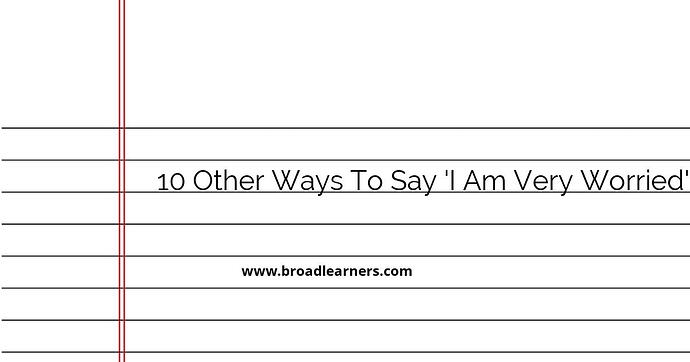Feeling worried is a common emotion that we all experience from time to time. However, using the same phrase 'I am very worried' repeatedly can become monotonous. In this article, we will explore 10 alternative ways to express the feeling of being worried:
- I am extremely concerned
- I am deeply troubled
- I am feeling anxious
- I am really stressed
- I am quite apprehensive
- I am feeling uneasy
- I am extremely unsettled
- I am seriously bothered
- I am genuinely disturbed
- I am feeling highly anxious
Now, let's take a closer look at each alternative and understand how they can be used in different contexts:
1. I am extremely concerned
When you are 'extremely concerned,' it means that you are deeply troubled or worried about a specific situation or issue. This phrase conveys a sense of seriousness and urgency.
Example: 'I am extremely concerned about the recent increase in crime rates in our neighborhood.'
2. I am deeply troubled
When you are 'deeply troubled,' it means that you are experiencing a great deal of worry or distress. This phrase indicates a profound level of concern.
Example: 'I am deeply troubled by the lack of progress in our project.'
3. I am feeling anxious
When you are 'feeling anxious,' it means that you are experiencing a state of unease, nervousness, or worry. This phrase is commonly used to describe general feelings of worry or apprehension.
Example: 'I am feeling anxious about the upcoming presentation.'
4. I am really stressed
When you are 'really stressed,' it means that you are under a significant amount of mental or emotional pressure. This phrase indicates a high level of worry or tension.
Example: 'I am really stressed about the upcoming deadline.'
5. I am quite apprehensive
When you are 'quite apprehensive,' it means that you are feeling hesitant, uncertain, or uneasy about a situation. This phrase suggests a moderate level of worry or concern.
Example: 'I am quite apprehensive about starting a new job.'
6. I am feeling uneasy
When you are 'feeling uneasy,' it means that you are experiencing a sense of discomfort or restlessness. This phrase conveys a subtle level of worry or unease.
Example: 'I am feeling uneasy about the outcome of the meeting.'
7. I am extremely unsettled
When you are 'extremely unsettled,' it means that you are feeling extremely disturbed, agitated, or anxious. This phrase indicates a high level of worry or unease.
Example: 'I am extremely unsettled by the recent turn of events.'
8. I am seriously bothered
When you are 'seriously bothered,' it means that something is causing you significant distress, annoyance, or worry. This phrase suggests a strong emotional reaction to a particular situation or issue.
Example: 'I am seriously bothered by the lack of communication within the team.'
9. I am genuinely disturbed
When you are 'genuinely disturbed,' it means that you are sincerely and deeply affected by something, causing you worry or concern. This phrase conveys a sense of authenticity and sincerity in expressing your worry.
Example: 'I am genuinely disturbed by the current state of the environment.'
10. I am feeling highly anxious
When you are 'feeling highly anxious,' it means that you are experiencing intense worry, unease, or nervousness. This phrase indicates an elevated level of concern or apprehension.
Example: 'I am feeling highly anxious about the upcoming exam.'
By using these alternative phrases, you can effectively communicate your worry or concern in a more varied and expressive manner. Remember to choose the phrase that best fits the context and intensity of your emotions. It's important to express your feelings honestly and seek support when needed.
Did I miss anything? Respond below
